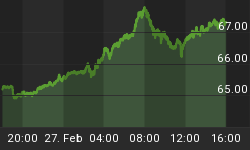Below is an extract from a commentary originally posted at www.speculative-investor.com on 16th June 2005.
We've been short-term bullish on the Dollar Index, which means short-term bearish on the euro because the dollar's value relative to the euro comprises almost 60% of the Dollar Index, since 20th December of last year. Furthermore, we expect to see a moderate amount of additional weakness in the euro over the next few months and a substantial amount of additional weakness over the coming year (as discussed in previous commentaries, our view is that EUR/USD is likely to drop to around 1.18 in the short-term and 1.08 within the next 12 months). However, the currency market action over the past few weeks is beginning to look quite similar to the action during the final weeks of last year; only this time it's the euro and not the US$ that is being driven relentlessly lower by the piling-on of speculators. Today's anti-euro sentiment is not as pervasive as the anti-dollar sentiment of several months ago and it is not occurring at the tail end of a 3-year decline, so it most likely doesn't have any implications beyond the near future. It does, however, suggest that a counter-trend move in the currency market -- an upward correction in the euro and a downward correction in the US$ -- has a good chance of beginning very soon.
Every relentless trend needs to have a good story behind it -- something to encourage the speculators to keep adding to their positions -- but it's not unusual for the story widely cited as being behind a move to actually be of only minor significance. During the final quarter of last year and the first quarter of this year, for example, the dominant story in the currency market revolved around the US trade and budget deficits. Specifically, the strongly-held belief that the US$ would continue to weaken until there was a big reduction in the aforementioned deficits, combined with the obvious fact that such a reduction was not going to occur in the foreseeable future, gave speculators the confidence to build-up, or maintain, large bets against the dollar. This was the case even though there has never been a consistent correlation between these deficits and the dollar's intermediate-term performance.
What has happened over the past few months, however, is that the US dollar has embarked on a cyclical bull market despite the fact that the twin deficits have continued to increase. Moreover, the main focus of speculation has turned from the dollar's problems to the rejections, by some important members of the European Monetary Union, of the proposed EU Constitution. Interest rate differentials all but guarantee significant additional weakness in the euro relative to the dollar before a new intermediate-term upward trend in the euro becomes possible; however, as far as relative currency values are concerned the recent gnashing of teeth over the future of Europe's political union is even less rational than the late-2004 and early-2005 conviction that the dollar was definitely going to move lower in the short-term as a result of the US trade deficit. What this means is that right now -- with the euro nearing important support at 1.18-1.20 and negativity towards it becoming extreme for reasons that really shouldn't have a large bearing on relative currency values -- wouldn't be a good time to initiate a bearish position on the euro.
In summary, we think the euro's decline is overdone in the very short-term, although we maintain that it will likely trade at 1.18 over the coming 3 months. As far as the coming year is concerned we suspect that the euro's major correction still has a considerable way to go, but looking out over the next 4 years we continue to think that the euro will eventually trade above its late-2004 peak (the large and growing US trade deficit IS very significant as far as the 2-5 year outlook is concerned).
From a very long-term perspective (5-10 years) the outlook for the euro is not rosy. Our view has always been that the euro was the ultimate fiat currency; not in a good way, but because it has never been backed by anything other than confidence and government force. It has never been anything other than pieces of paper and electronic entries in computers, so the fact that people willingly accept it in payment for valuable goods and services represents quite a remarkable achievement on the part of the governments and banks that brought this 'money' into being. The US$, on the other hand, evolved into the world's main currency over more than a century, and during all of its life apart from the past 35 years it was either as good as gold or was officially linked to gold in some way. Therefore, although the dollar is now a shadow of its former self there is a lot of history behind its almost universal acceptance and its role as the world's reserve currency.















